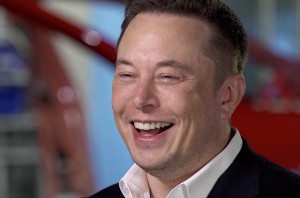
Why is this man smiling? Tesla CEO Elon Musk has a revolutionary new charging system named after him and he didn't even have to invent it.
The rocketing growth of new electric vehicles produced by automakers has producers of EV charging stations hustling to keep up; however, a new innovation may circumvent the need for the onslaught of stations.
The Swedish city of Lund is conducting a trial of a roadway that charges electric vehicles as they roll down the “tarmac.” Named “Elonroad,” after Tesla co-founder and CEO Elon Musk, the plans call for a 1 kilometer stretch of road to be a test bed for the new technology.
The purpose is to contribute to increasing knowledge about electricity routes as part of the future fossil-free transport system, says Elvag Syd, the company working with the Swedish Transport Administration, on the project. It´s the first electric road with ground level feeding system tested for buses in a city. The project is a test and demonstration project from 2019-2022.
Swedish officials believe the first stretch of road will be ready next year. The experimental road will be part of a bus route, charging those buses as they travel around town. If the road turns out to be successful, it could spell the end for charging stations.
(Electrifying America. Click Here to see how its going.)
The road has one big advantage over the current set up. Researchers claim Elonroad systems would allow electric cars to use 80% smaller batteries. Smaller batteries cut weight, lower costs and emit less pollution.
The Elonroad electric road system works for all electric vehicles: cars, taxis, buses and trucks. Compared with overhead lines that doesn´t work for cars. Cars stand for 60% of the transport greenhouse gases.
Elonroads electric road and park charger transfers high power up to 240kW with a 97% efficiency. They also use small, individually charged “rail” to do the charging, making them safe as well.
(Google wants to take the guesswork out of EV charging. Click Here to find out how.)
There is a potential downside is that it may cut into the economies of scale needed to keep driving battery prices down. Smaller batteries will require more mining of scarce materials like lithium and cobalt to electrify more vehicles.
It will take a couple of years before the Elonroad system becomes common. But the start at Lund is inspiring as the first real-world test of the Elonroad system.
“It´s the dawn of a new industry and an opportunity to build a sustainable world,” the company notes on its website.
(To see more about why just one in six American’s are ready to buy an EV, Click Here.)
Lund University conducted an economic feasibility from a societal perspective, concluding is that electric road is beneficial if both trucks and cars can use the infrastructure.

Still another dream (or nightmare). Who would pay to install and maintain these magic roads? In the US, especially Michigan, we can’t even patch the potholes in existing roads much less rebuilding the existing ones. I imagine the electrical power to charge these batteries will also magically appear.
Going forward, a more fundamental question is who will pay road taxes, and how. That’s something several states are already dealing with, as they need to find a way to sub for lost gas taxes when people are driving EVs.
Paul E.